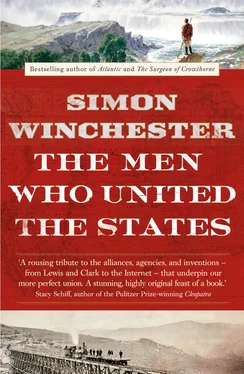Such was the crowd’s exuberance that much of what the president said was drowned in a cacophony of cheering and frenzied delight. Sensing the mood, he prudently kept what he had to say brief and to the point. After no more than ten minutes of high rhetoric, the tone of his voice fell and quieted—he was coming to the end.
“I believe we can seize this future together,” he said, “because we are not as divided as our politics suggests. We’re not as cynical as the pundits believe. We are greater than the sum of our individual ambitions, and we remain more than a collection of red states and blue states. We are and forever will be”—and here he paused for just a beat, to add solemn emphasis to the adjective—“the United States of America.”
The United States. This unique national quality—of first becoming and then remaining so decidedly united—is a creation that, in spite of episodes of trial and war and suffering and stress, has been sustained for almost two and half centuries across the great magical confusion that is the American nation. The account that follows, then, is on one level a meditation on the nature of this American unity, a hymn to the creation of oneness, a parsing of the rich complexities that lie behind the country’s so-simple-sounding motto: E pluribus unum .
America is, after all, a nation founded as a home for the single simple ideal of universal human freedom. The country was established as a grand experiment, with people invited from all over the world to take part, to help build a nation of free souls, each to be given an equal opportunity to seek as each saw best the greatest happiness for themselves. The question I try to address in the following chapters is: just how has it managed to adhere, to keep itself annealed into one for all the years and decades since?
Unity among peoples, in a country as complicated as America, is just not an organic thing. In countries with less convoluted pedigrees it might well be. By way of analogy, people in tribes tend toward natural unity—whether they are Kikuyu, Comanche, Wurundjeri, or Micmac, individuals within each tribe bond together tightly. Clans in Scotland are proud of being firm-welded entities of great antiquity—all McKenzies and MacNeils are one, Scots like to say, whether fortune or happenstance has led them to be dukes or dustmen. Elsewhere class and the tendency toward an intellectual aristocracy have magnified a sense of union—Etonians, graduates of Hotchkiss and Science Po, Harvard and Christ Church may all bond clubbably, as may most European marquesses and counts or their American equivalents, the Biddles, Lowells, Cabots, and Saltonstalls. Race likewise has an annealing affect: Harlem and Hough and Watts and a score of other places have long offered local concentrations of great resilience, strength, and pride.
But America as a whole, once its early Puritan settlement had been diluted by those who followed or those already there, became too much of a mongrel nation to enjoy the simpler organic benefits of union. Lacking the communal simplicities afforded in some other countries—Japan, say, or Norway—by the existence of one race, one ethnic group, or a single class or a dominant intellectual or spiritual tendency, the great experiment that is America has had to make a union for itself, not wish it to grow in the dark out of time and nothing. It has done so purposefully by the deliberate acts of its own people. Man has had to do the hard work in bringing America together, forging something that in other, less complex places has been accomplished much more simply.
And surely all must agree that man in America, bent to this single task, has done most creditably. Excepting of course the tragic period in the 1860s when the union was so cruelly tested by civil war, this work has been performed with a consummate degree of success. The states are now generally united, and as a body united, the nation has enjoyed a steady growth of prosperity and power known by no other country on earth. And all the while, the American people have managed to remain staunchly together while countries in so many rival regions around the world—in Europe, Russia, China, and India—have been plagued by bickering and struggling and division, and have been rendered much the lesser thereby.
But just how has America’s uniquely stable union been achieved? What factors have ensured that, say, a Chinese migrant in rain-swept Seattle can find himself locked in some near-mystical concord with a Sephardic Jewish woman in Manhattan or a Cherokee student in Minnesota or a Latina stallholder in a market in Albuquerque—all of them being able to enjoy the same rights and aspirations, encapsulated in their shared ability to declare so simply, I am an American?
How did the notion of creating a more perfect union of such peoples and of such administrative entities—the now fifty states, comprising the 2,955 counties of forty-eight of them, the 64 Louisiana parishes, and the 18 Alaska boroughs—first come about? And how did this idea of union translate into the practical, physical, and concrete terms we know today, which have worn so well and lastingly?
The main purpose of the pages that follow is to consider what might be called the physiology and the physics of the country, the strands of connective tissue that have allowed it to achieve all it has, and yet to keep itself together while doing so.
For the ties that bind are most definitely, in their essence, practical and physical things. It would of course be idle to dismiss the adhesive nature of the ideas on which the nation was founded. It would be a grave mistake to forget that the guiding national concept is based on a set of common purposes, on ideals and constitutionally guaranteed freedoms that are so publicly cherished by all. But over the years, these inchoate things have all been of necessity underpinned by innumerable real, visible, tangible connections—by survey lines and marks; by roads; by canals; by railways, telephone lines, power grids; and, more recently, by submerged rivers of electrons—all of which have proved crucial both in maintaining the union and in preventing, or at least lessening the likelihood of, its fracturing and spinning into a thousand separate parts.
This book tells the story of making such connections as these and of the remarkable and visionary figures from the country’s history who first made them.
Most of them were already Americans when they did so. Though we might nowadays wish it were otherwise, most—but not all—were men. Most of their achievements—but not all, most especially that which permitted the private ownership of land—were made after the Louisiana Purchase, which suddenly doubled the country’s size into the truly transcontinental entity it is today. Most of their achievements—but not all—remain as vital to the nation’s preservation as they were when first they were created.
From the very visible nineteenth-century explorations of the Lewis and Clark expedition, by way of the geological surveying expeditions and the highway-building ventures and waterway excavations, to the less easily describable twenty-first-century mystery makings of the Internet communications backbone—there are fully two centuries of inventive zeal that have left as legacy a nation now as comprehensively interconnected and as practically unified as it is possible to imagine.
But how best to organize the wealth of work that has brought about this unity? The sheer complications of it all—the overlappings of the work of road builders and survey makers, of the pioneers of flight and the makers of radio, of the work of those who dug canals and those who excavated the tunnels for the railroad lines—made it well-nigh impossible to narrate the story in purely chronological terms. By the same token, to list the characters who were involved in the forging of the union would lend the account the feel of a catalog or an encyclopedia. A device was needed, it seemed to me, that would link the achievements thematically and give the story some greater degree of structure and logic.
Читать дальше












